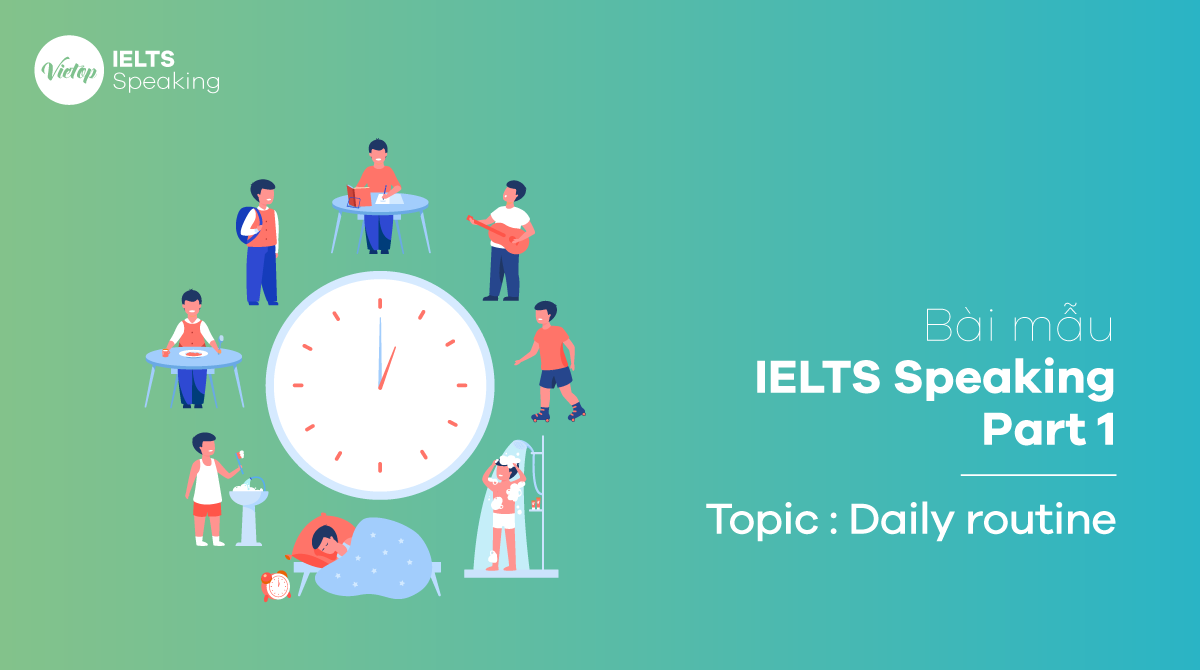Chủ đề Daily routine – Sinh hoạt thường ngày là chủ đề quen thuộc trong IELTS Speaking. Song, để tạo được ấn tượng mạnh với giám khảo thì không phải ai cũng có thể làm được. Cùng Vietop tham khảo ngay một số câu trả lời cho chủ đề Daily routine – IELTS Speaking part 1 nhé!
1. Daily routine là gì?
Daily routine là một cụm từ trong tiếng Anh có nghĩa là lịch trình hàng ngày hoặc thói quen hàng ngày.

Daily routine thường được sử dụng để mô tả chuỗi các hoạt động, nhiệm vụ, và thói quen mà một người thực hiện hàng ngày, từ thức dậy vào buổi sáng đến khi đi ngủ vào buổi tối.
Daily routine bao gồm các hoạt động như ăn sáng, làm việc, học tập, vận động, giải trí, và các công việc khác trong cuộc sống hàng ngày. Việc hiểu và quản lý daily routine có thể giúp bạn tăng năng suất và tạo ra một lối sống có tổ chức hơn.
Dưới đây là vài ví dụ về daily routine (lịch trình hàng ngày) bằng tiếng Anh:
- Morning Routine (Lịch trình buổi sáng):
- I wake up at 6:30 AM.
- I brush my teeth and take a shower.
- I have breakfast, usually cereal and coffee.
- I check my emails before heading to work or school.
- Workday Routine (Lịch trình ngày làm việc):
- I arrive at the office at 9 AM.
- I have meetings and conference calls throughout the day.
- I take a lunch break at noon.
- I leave work at 5 PM and head to the gym for a workout.
- In the evening, I prepare dinner and relax by watching TV or reading.
- Weekend Routine (Lịch trình cuối tuần):
- On Saturdays, I sleep in until 9 AM.
- I often go grocery shopping in the morning.
- I meet up with friends for lunch or go for a hike in the afternoon.
- Sundays are more relaxed; I spend time with family, catch up on chores, and do some leisure reading.
- Student’s Routine (Lịch trình của một học sinh):
- Retiree’s Routine (Lịch trình của một người đã nghỉ hưu):
- I wake up without an alarm clock, usually around 8 AM.
- I enjoy a leisurely breakfast and read the newspaper.
- I spend my days pursuing hobbies like gardening and painting.
- In the evenings, I watch movies or attend social gatherings with friends.
Nhớ rằng daily routine của mỗi người có thể khác nhau tùy thuộc vào công việc, tuổi tác và sở thích cá nhân.
Xem thêm:
Luyện IELTS 4.0 hiệu quả với chi phí hợp lý. Đăng ký ngay khóa học IELTS 4.0 của Vietop English
2. Bài mẫu your daily routine – IELTS Speaking part 1

Mời các bạn nghe Audio bài mẫu Daily routine tại đây nhé!
2.1. What is your daily routine?
Although I’m not a morning person, I usually make an effort to get up as early as I can so that I can do whatever I like with more time. I work out for 30 minutes in the morning. I go to work at 8:30 am and return at 6:00 pm. I frequently let my mind rest by surfing the Internet at 11 o’clock to end the day. My daily schedule is flexible, though. It depends on how many obligations I have.
- Morning person (n): người dậy sớm
- Work out (v): tập thể dục
- Let sb’s mind rest (v): nghỉ ngơi
- Obligation (n): trách nhiệm, nghĩa vụ
Hoặc:
My everyday activities are determined by my job schedule, so nothing is set in stone. But the one thing I never break is keeping a journal, which allows me to reflect on myself at the end of the day. I spend most of the day at work, but still try to make time to eat and rest well, and also cover at least 10 pages of books before bed.
- Be set in stone: cố định, không thay đổi
- Cover (some) pages: đọc sách
2.2. Have you ever changed your routine?
I have, indeed. I used to work and study at night so that I could focus better, and the stillness helps me concentrate. However, since I had to work in the office in the morning, I’ve learnt to get used to working and studying during the day time. I found it tough to focus on my work for the first time. But now, even if it’s not something I enjoy doing, it’s manageable to keep up with.
- Stillness (n): Sự yên tĩnh
- Tough (adj): Khó khăn
- Manageable (adj): Có thể kiểm soát được
- Keep up with (v): Theo kịp
Xem thêm: Khóa học IELTS Cấp tốc – Cam kết tăng ít nhất 0.5 – 1.0 band score SAU 1 THÁNG HỌC
2.3. What part of your day do you like best?
I adore the time when I go home from work late at night and everything is bathed in drab gray light. For me, it’s a perfect opportunity to relax on the bed and catch up with my housemates, surf the web, listen to music, or watch a movie.
- To be bathed (a): đắm chìm
- Drab gray light (n): Ánh sáng xám xịt
- Catch up with (v): Trò chuyện
Hoặc:
When I go home from work and sit down to dine with my family at 7 o’clock in the evening, that is my favorite moment of the day. I look forward to this time of the day the most since it can make me feel energized after a long, exhausting day at work.
- Energized (adj): được cung cấp năng lượng
2.4. Do you usually have the same routine everyday?
No. I don’t have a set schedule anymore since I’ve begun working. I maintain an open mind and work hard to improve every aspect of my life. On Sunday, I choose to stay in bed rather than get up early. In addition, I explore new interests like going out to dine, reading a book, or taking up a sport. My new interest motivates me to work and study more effectively.
- Maintain an open mind: Duy trì một tâm trí cởi mở
- Take up (v): Bắt đầu
- Motivate (v): Thúc đẩy
- Effective (a): Hiệu quả
2.5. What is the busiest part of the day for you?
In addition to being my favorite time of day, the evening is also my busiest part. I’m struggling to finish all deadlines before the new day begins. I focus on doing a good job since there is no better motivator than the desire to go asleep.
- Struggle (v): ráng sức
- Desire (n): Mong muốn
Hoặc:
Due to my habit of putting off tasks until the last minute, I frequently become very busy at night. However, I do enjoy working during this time since there is no better motivator than the want to go to sleep.
- Put off: trì hoãn
2.6. What would you like to change in your daily routine?
I would love to incorporate fitness into my everyday regimen, if time allows. I’m not ignorant of the benefits exercise can have on my health; I’m just having trouble finding time to fit in a workout with my busy schedule.
- Incorporate fitness into my everyday regimen: Kết hợp thể dục vào chế độ sinh hoạt thường ngày
- Ignorant (adj): Phớt lờ
2.7. Do you like to plan what you will do each day?
Yes, it is what I want. I can maintain control over the day via planning. My life improves as I get more structured. I try to maintain order in all of my activities because I’m pretty orderly at work.
- Structured = orderly (a): có trật tự, có sắp xếp
2.8. What’s the difference in routine between you and your teenage times?
I can definitely say that my life now and then are very different. You know, when I was a teenager, I had plenty of free time to follow my interests like watching movies or listening to music in addition to concentrating on my studies. On the other hand, my schedule and time management have tightened up now. I haven’t had much free time since I graduated from college and started working as an English teacher because I’m so busy at work.
- Follow sb’s interests: Theo đuổi sở thích
- Concentrate on (v): Tập trung
- Tighten up (v): Thắt chặt
2.9. Do you usually have the same routine every day?
When I was still a student, I used to keep up with a fixed routine. However, I don’t have a set schedule anymore since I am often up to ears with a lot of work on a daily basis. Due to the flexibility of my job schedule, there are days when I may simply sleep in and other days when I must get up really early.
- Be up to ears (with work): bận rộn, nhiều việc
- Sleep in: ngủ nướng
Xem thêm:
3. Bài mẫu the role of daily routine – IELTS Speaking part 1

Mời các bạn nghe Audio bài mẫu the role of daily routine tại đây nhé!
3.1. Do you think it is important to have a daily routine?
Yes. Having a good daily routine will enable you to plan your activities wisely. Without a daily schedule, people frequently act impulsively, which can waste time and decrease productivity. I believe developing a regular regimen will be more beneficial for individuals who lack organization.
- Enable sb to V: Cho phép ai làm gì
- Impulsive (a): không cẩn thận, bốc đồng
- A regular regimen (n): Chế độ hàng ngày
- Beneficial (a): Có lợi
Hoặc:
I do believe that having a fixed routine is healthy and essential. Human bodies have a biological clock that operates on a set schedule so we can protect our bodies against shock by adhering to a certain pattern every day.
- Biological clock: đồng hồ sinh học
- Adhere to s.th: tuân thủ theo cái gì
3.2. Do you think it is possible to learn how to manage your time?
Sure! I schedule my daily chores and carry them out as planned, which aids in time management. Setting goals and judicious prioritization are two ways that can help them to learn how to manage their time. It’s better to set time constraints for each activity and finish them as soon as possible.
- Daily chores (n): Công việc hàng ngày
- Carry out (v): thực hiện, tiến hành
- Aid in (v): Giúp đỡ
- Judicious prioritization: Ưu tiên hợp lý
- Time constraints (n): Hạn chế thời gian
3.3. Why do you think some people don’t plan their day in advance?
Some people resist making an advance plan for their day because they are concerned that it won’t work or won’t be good enough. While some people are adept at creating plans, they procrastinate when it comes to implementing the same.
- Resist (v): Tránh, kháng cự
- Adept at (adj): Tài giỏi, lão luyện
- Procrastinate (v): Trì hoãn
- Implement (v): tiến hành
Trên đây là một số câu trả lời mẫu cho Daily routine – IELTS Speaking Part 1. Hy vọng rằng qua bài viết này, các bạn học tiếng Anh nói chung và học IELTS nói riêng sẽ có được góc nhìn tổng quan nhất về chủ đề Daily Routine trong IELTS Speaking Part 1 nhé. Vietop English chúc các bạn chinh phục thành công môn tiếng Anh!









